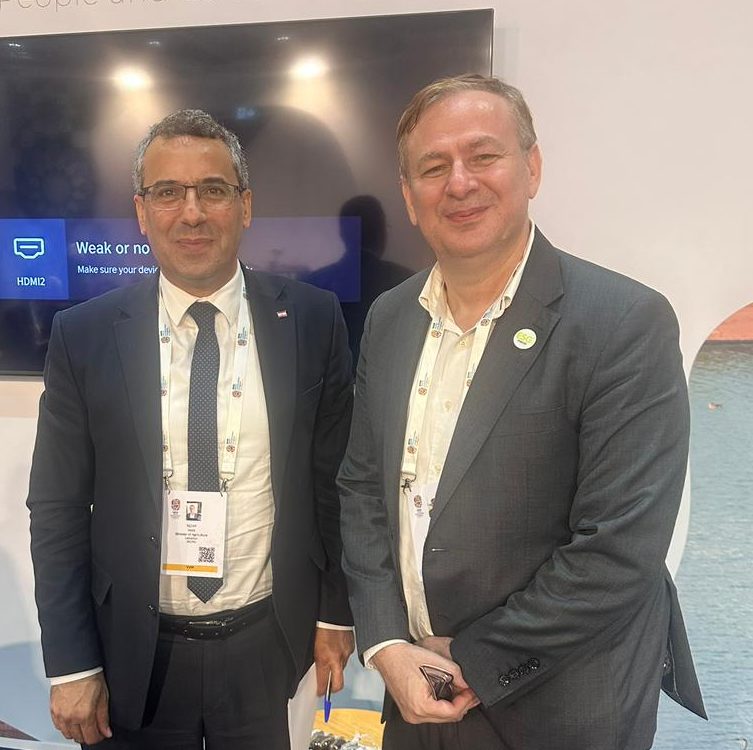Amid Lebanon’s economic, environmental, and political challenges, the agricultural sector is striving to reclaim its pivotal role in supporting the national economy and ensuring food security. In this interview, Lebanese Minister of Agriculture Dr. Nizar Hani discusses the current state of the agricultural sector, efforts to modernize and reform it, governance challenges, agricultural education, international partnerships, and the future of exports to Gulf countries.
Lebanon has outstanding scientific competencies of global caliber in various fields. However, there seems to be a clear gap between academic excellence and on-the-ground implementation. In your view, where does the problem lie, and how can this gap be bridged?
Lebanon indeed possesses tremendous scientific potential, and we have many prominent names in different fields. The problem lies in the disconnect between scientific research and field application. That’s why, at the Ministry of Agriculture, we have begun addressing this issue by creating what we call the “Network of Partners,” which brings together academics, international organizations, and farmers across regions such as Hermel, to strengthen practical collaboration among them.
How are these initiatives being translated into concrete action?
We have established national committees for each sector — the National Olive Committee, the Honey Committee, and the Agricultural Work Committee, among others. Each committee works to develop its sector in a specialized way. We are also preparing the National Agricultural Strategy for Lebanon (2025–2035), which brings together all key stakeholders in the sector to achieve long-term goals.
In recent years, Lebanon’s agricultural sector suffered major blows due to the COVID-19 pandemic, the Syrian war, and border closures. What was the extent of the damage, and how are you working to address it?
According to the World Bank, damages in the agricultural sector reached around $172 million, while total losses amounted to nearly $800 million, close to one billion dollars. We currently have several projects underway, some funded by the government and others by international partners. We have also secured a $200 million loan dedicated exclusively to the agricultural sector — the first of its kind in Lebanon.
What about developing agricultural knowledge among farmers in rural areas such as Akkar, Hermel, and Rashaya?
We launched the National Agricultural Extension Program, a comprehensive training initiative targeting farmers across all Lebanese regions. The training aligns with the actual needs of each agricultural season. For example, we are currently training farmers on field management and productivity enhancement, introducing them to modern tools such as electric pruners and battery-powered equipment. It’s a continuous process that requires time and effort, but we have taken steady steps forward.
Governance in the agricultural sector is a critical issue, especially amid concerns about links between food and chronic diseases such as cancer. What is the ministry doing in this regard?
We started by creating the National Agricultural Register, and we are calling on all farmers to register and obtain an Agricultural ID Card that includes a unique national agricultural number. Through this, farmers will be able to receive both financial and non-financial support directly and transparently. We are also developing this card into a payment card to be used for agricultural transactions. Additionally, we launched a comprehensive agricultural census conducted every ten years to guide Lebanon’s agriculture through scientific planning.
Many farmers prefer shortcuts to maximize profits, which often leads to excessive use of chemicals. How is the ministry addressing this issue?
We issued a decision stating that agricultural supply stores cannot sell any pesticide without a prescription issued by a licensed agricultural engineer, starting April 1, 2026. This measure aims to control pesticide use and strengthen monitoring. We have also trained agricultural engineers in collaboration with the Engineers Syndicate to enhance their skills in fertilizers and pesticides. Moreover, we have established specialized monitoring committees, such as the Pesticides Committee and the Fertilizers Committee, which operate under EU standards to ensure product safety.
What about the problem of smuggled or counterfeit agricultural pesticides and fertilizers?
Smuggling remains a major challenge, but in coordination with the Lebanese Army and security agencies, we managed in recent months to seize around 35 tons of unsafe agricultural chemicals and shut down several violating stores across the country. The ministry has regained its regulatory role after years of absence, and we are reinforcing the concept of sustained oversight across all relevant ministries.
Let’s move to organic agriculture — what is its current status in Lebanon?
Organic agriculture has become a central component of our plans. Lebanon is among the few countries with a specific law for organic farming. This year, we established the National Committee for Organic Agriculture to implement the decree issued in 2020. Its role is to regulate the sector and monitor compliance. Another key step was launching an agricultural production traceability system, allowing each farmer to record their practices and obtain a health certificate enabling exports.
Could you give a practical example of how this system works?
Yes. For instance, avocado farmers exporting to Turkey are now required to register their orchards and document every agricultural step they take. This ensures transparency and allows them to obtain an export certificate.
Finally, what are the latest developments in agricultural relations with Gulf countries, particularly the UAE and Saudi Arabia?
The Gulf remains the primary market for Lebanese produce. However, we currently face the problem of the land route closure through Saudi Arabia due to previous incidents, which prevents Lebanese trucks from even transiting. We are now negotiating to allow goods to pass through Saudi territory even without direct entry permissions. Unfortunately, sea and air transport remain the only options for now, despite their high costs. Nevertheless, we are optimistic — we have made significant progress in the negotiations, and we hope land exports to Gulf markets will soon resume.




